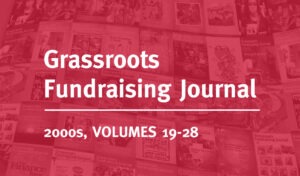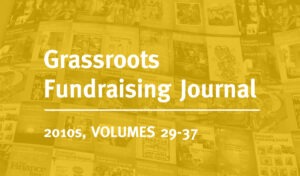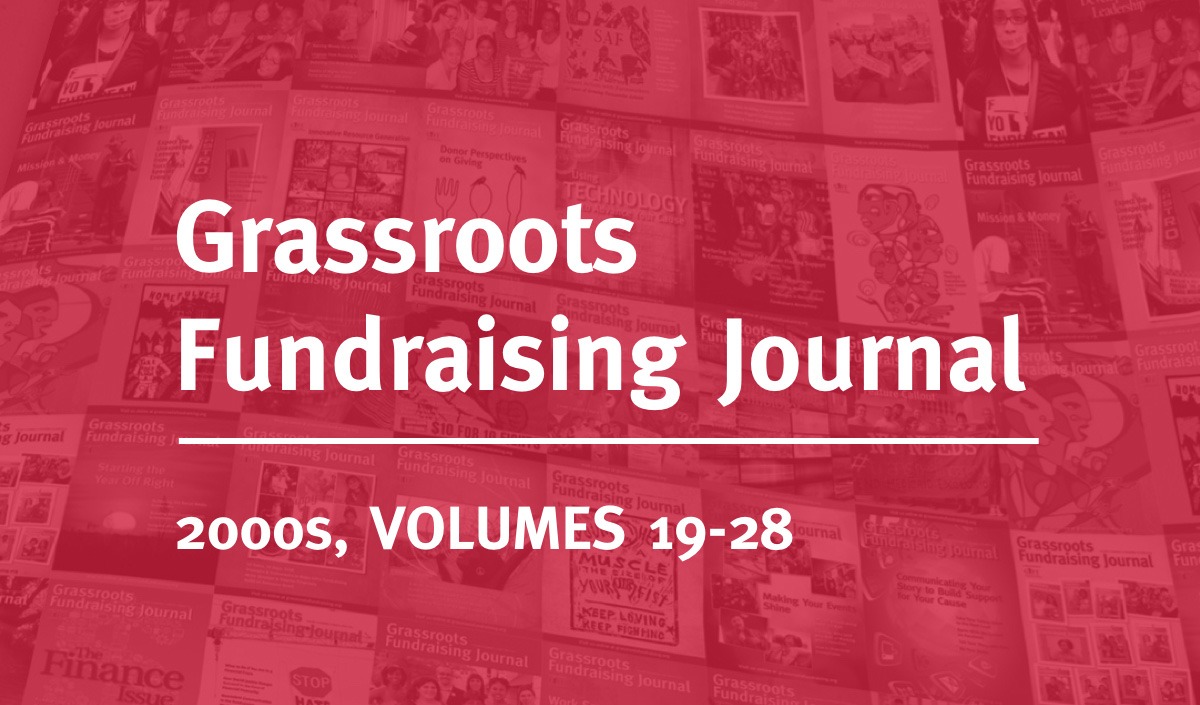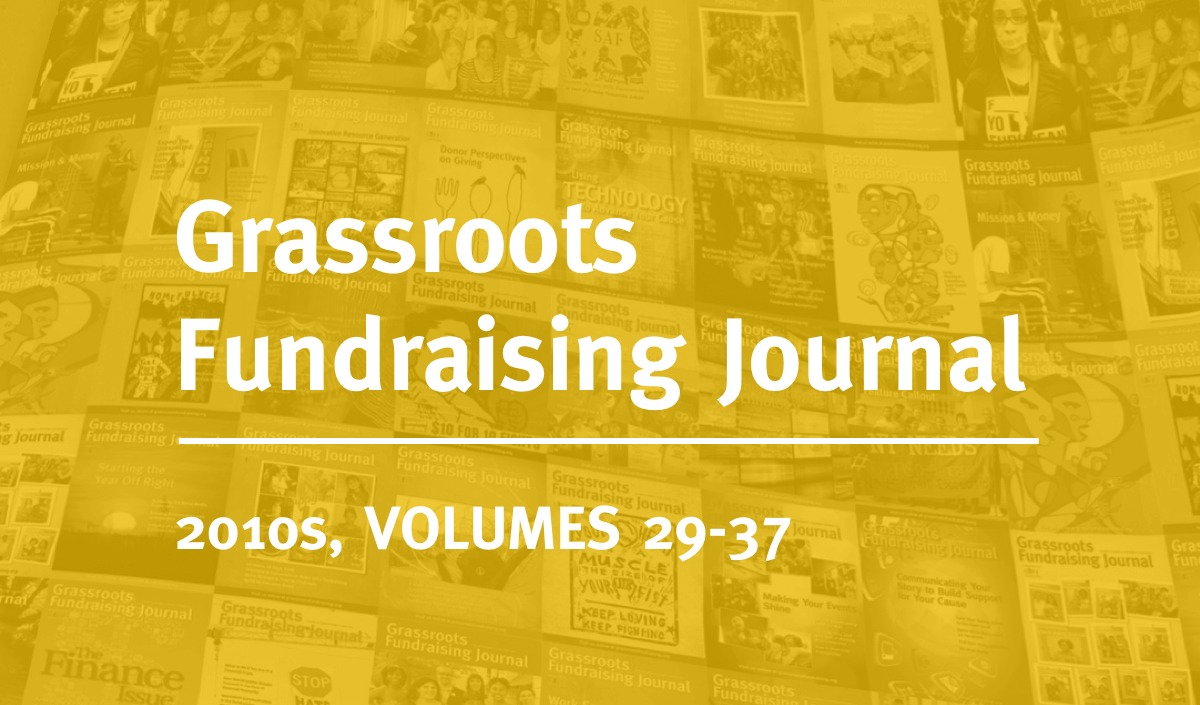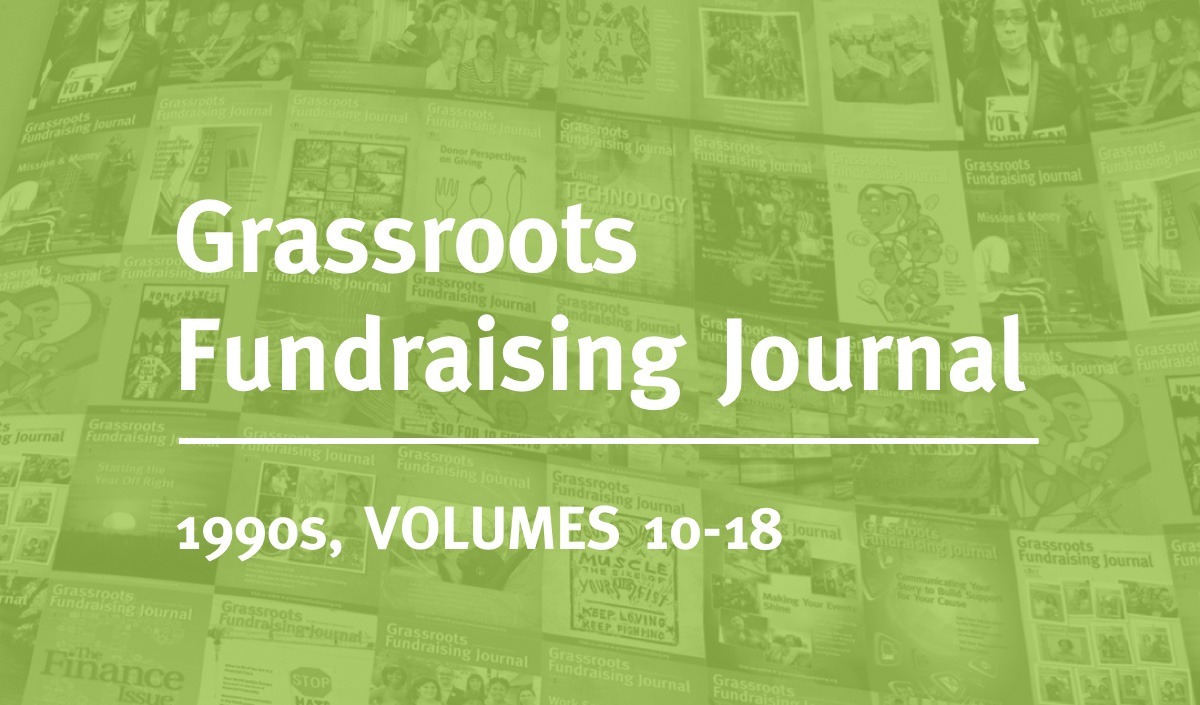
Editors’ note: This article, first published in print during October-1994, has been republished for Nonprofit Quarterly with minor updates.
I was recently asked to give a talk at the annual conference of the Women’s Funding Network. I decided to share with the group the ten biggest mistakes I have made during my seventeen years of fundraising. This article is taken from that talk.
One of the most important lessons to remember in teaching is that people learn as much (and sometimes more) from your mistakes as from your successes. In my workshops I have always tried to share mistakes that I have made or that I have been a party to, but this is the first time I have tried to prioritize them into the top ten.
My challenge to you is to avoid these mistakes — of course, you will make mistakes, but try to make new mistakes. Invent whole new categories and themes of mistakes. There is something sad and banal about making mistakes that someone else has already made.
THE TOP TEN
When I say these are the top ten mistakes I have made, I don’t mean that they are the worst mistakes I have made or the most disastrous, but the ones I made the most frequently and the ones that are the most avoidable by others. So, in no particular order, here they are.
1. Looking for money in all the wrong places
By now I hope you know that 90% of all the money given away in the United States comes from individuals, and that 82% of that money comes from families that have incomes of $60,000 or less. Even knowing these facts, I spent the first few years of my fundraising life trying to raise money from foundations, corporations, and people who were rumored to “have money.” Once I finally realized the obvious implication of the fact that if the majority of money is given by middle-class people, the majority of my efforts should be focused on this group, I began to really raise money.
2. Asking people for gifts of $500 and more who had not been properly qualified as “prospects”
For many years after ceasing to repeat mistake #1, I adopted this mistake. I would hear or read that someone gave $500 to the symphony and immediately think the person was a prospect for a group working on rent control or a civil rights initiative. After all, I knew they gave money, so I wasn’t falling into the trap of looking for people who “have” money. I knew how much they gave, and I knew their name.
But this is not enough. To be a prospect for a major gift, a person has to have demonstrated ability to give money. They also must have demonstrated a belief in the cause for which you are fundraising or in a similar cause. Even though people who give money to symphonies might be sympathetic to rent control, there is no inherent reason to think that will be so.
Finally, someone in the group needs to know about the prospect or know someone who knows them. Once you have positive verifiable information that someone you know or know of gives money and cares about your cause or a similar cause, you have a prospect. If you are missing any of those things, you don’t have a prospect.
If you ask someone for money who is not properly qualified as a prospect, you greatly increase your chances of getting turned down, and you can give the prospect the impression that your organization really doesn’t know what it is doing.
In learning to overcome this mistake, I was most helped by the Buddhist saying, “We have so little time, we must proceed very slowly.” Take the time necessary to qualify people, to find out what you need to know to be confident of their interest in the cause, and to assign the solicitation to someone who has enough of a relationship with the prospect to be able to set up a meeting.
3. Seeing donors as water faucets: turning them on when I want money, and leaving them off otherwise
In the last ten years, many of the organizations I have worked with have had “building an endowment” as part of their long-range dream. An endowment is a good idea: a glorified savings account that yields a certain amount of money year in and year out.
However, keep in mind that your donors are already an endowment: a group of people who, if treated properly, will also yield a certain amount of money year in and year out.
In this light, you can see why building relationships with donors becomes of paramount importance. Some of these relationships will happen naturally. You and the donor will like each other and become friends. Some of these relationships already exist among board members, volunteers, and people on the donor list. Others take more work. Ask yourself if the donor would make a good board candidate or a good committee member.
If neither of these options works out, at least write or call each major donor two or three times a year without asking them for money. Send them information you think they would find interesting or call to invite them to an event the group is putting on or just to tell them something about your group. Call to thank them for their gift and chat briefly. The relationship does not have to have a great deal of depth, but my mistake early on was focusing only on my need to raise money and only seeing the donor as a vehicle to meet that need.
If you have hundreds or thousands of donors, you can’t possibly know them all, but you can make sure that your most loyal donors are contacted occasionally.
4. Not asking for money
A classic mistake is to do everything right — identify the prospect, set up the meeting, have an interesting conversation, and know that the prospect is very enthusiastic about your group — and then lose your nerve. I sometimes ended solicitations with “Well, thanks for your time and we’ll be in touch,” or even the more pitiful, “Whatever you can do, we will be most grateful.” I am sure the prospects felt as frustrated as I did by my lack of direction.
A variation on this mistake is to strike up a conversation, learn that the person is very interested in your group, offer to send more information and be in touch, and then not do it. You might lose the address, or decide on reflection that the person was just being polite, or that a pressing grant deadline takes priority. By the time you can get to following up, you decide it is too late.
Dozens and dozens of gifts vaporized for me during the years I made this mistake (which I occasionally still make).
Avoiding this mistake requires a daily commitment to introduce money into as many conversations as possible. It requires keeping in mind that people are paying groups I work for to do work they want to see happen: ending racism, stopping pollution, reforming health care, or whatever. People want to help; my job is to facilitate that desire and suggest that making a donation is a concrete and very helpful thing to do.
It is also critical to remember that people who are interested in your group are puzzled when you don’t bring up money; they are left feeling you must not need it or you would have mentioned it.
Sign up for our free newsletters
Subscribe to NPQ's newsletters to have our top stories delivered directly to your inbox.
By signing up, you agree to our privacy policy and terms of use, and to receive messages from NPQ and our partners.
5. Using war-like language to describe asking for money
We constantly hear phrases such as “hitting up donors,” “twisting their arms,” “sitting on them,” making them “cough up,” “going for the jugular,” “twisting the knife,” getting the donor to “pop,” and so on.
This kind of language dehumanizes both the solicitor and the donor. It puts the solicitor into an aggressive mode and makes getting the gift an act of winning or losing. I’ve made a lot more friends and had a lot more fun and, not coincidentally, raised a lot more money since abandoning that language (and, therefore, that attitude).
6. Exaggerating the importance of any one interaction
I have spent thousands of pointless hours, often in the middle of the night, replaying an interaction with a prospect or a donor in which I felt I made a monumental faux pas, irreparably damaging our relationship and destroying the organization’s chances of ever getting money again. With each replay in my mind, my bungle becomes more embarrassing.
These incredible gaffes would be something like the following: I see the donor at an event with her new baby and say, “What a cute baby.” Later at home I deride myself with, “How true, how stupid. ‘Cute.’ What a vapid word. Couldn’t I have said something more meaningful about the child?” Or I say to a donor, “Could you double your gift?” and when the donor says, “I don’t think so…possibly. Let me think about it,” I respond, “It would be really great if you could. You don’t have to give it all at once, but you can pay it out in a pledge.” I end the conversation agreeing to talk in a few days, but later at home I scold myself with, “I shouldn’t have been so pushy. Now she thinks our group is greedy,” or “I should have pushed harder. Now she thinks our group is wimpy.” Torturing myself with both scenarios could keep me awake for several hours.
The worst was when a donor actually complained about something. “Kim, there were three typos in the newsletter — it looks sloppy.” I apologized and later believed absolutely that this person would never give another donation.
Obviously all of this self-rebuke reflected a lack of confidence in myself, but it also reflected the fact that I was giving way too much importance to interactions that were in themselves not important. Certainly the donors were not staying awake playing our conversations over and over and looking for hidden meanings in my comments. People who complained were usually trying to be helpful.
I got over this mistake by lowering my sense of my own importance.
7. Being afraid to disagree with donors
Similar to #6 was an idea I carried that donors should not be contradicted or they may not give again. In fact, donors, like the rest of us, are interested in issues and learn by debating, discussing, and being presented with new information.
Mistakes #5 through #7 were all part of a large mistake of seeing the donor as separate from me. However, I am always a donor myself to the groups I work for and believe in, and all my friends are people who give away some money to some groups. The distinctions I was drawing were false and misleading. Would I feel free to disagree with a friend or a colleague? Certainly. Would I tell a volunteer or board member if I thought their idea might not work? Of course. Real relationships are built on the ability to have honest dialogue among all the parties.
8. Knowing it was easier to do it myself and being certain I could do it better
This perception is often not a mistake. Most often I did know best how to get a fundraising task done. But when I was the only one who knew how to do something, I always had to do it whether I wanted to or not or whether I had the time to do it or not. Not only did I make myself indispensable, a liability to my group (what if I got hit by a truck?), but I also kept my group from growing and advancing by not empowering others with fundraising skills and knowledge.
So, I learned to be a trainer and to train others to raise money. The training, writing, and consulting I have done have been my most important contribution to the nonprofit sector, with far more lasting results than the money I have raised myself.
I have avoided the “do it myself ” trap for many years by adapting the first rule of organizing to fundraising, “Never do anything for someone that they can do for themselves.” Good fundraising involves a lot of people doing the asking and feeling comfortable with the process, and a critical piece of fundraising is training others.
9. Not holding people to the commitments they made
I used to think that if someone said they would do something, they would do it. If they didn’t do it, I saw it as a sign that they were not serious about the work. In fact, this is not true even of me. I commit to things, then forget to do them, or keep moving them from one to-do list to another and never get around to doing them until someone calls me.
My friend Sharon Delugach, who is a fundraiser and organizer in Los Angeles, always says, “Fundraising is 10% perspiration and 90% follow-up. When people say they will do something, assume they will; if they don’t, assume they just forgot.” Now I follow up with people on what they said they’d do, and most people honor their commitments most of the time.
10. Letting lack of knowledge stop me from trying new things
Many people have asked me questions over the years about grassroots organizations’ ability to fundraise. Can a small group have a planned giving program? How do you raise money from a constituency that consists in large part of people on welfare? How can gay and lesbian groups raise money from straight people? What, if anything, is different about raising money if you are a person using a wheelchair?
I didn’t know the answers to these questions, and I would venture to say that no one did. People had their own ideas and their own experiences, but a lot of work in raising money for grassroots organizations was speculative.
If we had waited for articles to be published or studies to be done, we would be long out of business. How do you find out if a small group can do a planned giving program? By setting one up, or preferably by setting up several and monitoring them.
The Center for Third World Organizing has this motto, “We will find a path, or make one.” If knowledge doesn’t exist now, create it. Experiment. Value your own experience, and know that your experience is knowledge: not all knowledge, but it adds to the existing information.
WHAT I DID RIGHT
Of all the many mistakes I made, I did always do something right, which has helped me in learning from my mistakes and avoiding many others I might have made. That was always to give money myself and come back to my own experience of being a donor. Even when my biggest gift was $100 or $50, I still knew the feeling of sitting down and deciding how much I could afford to give.
I have always given away 10% of my income, and in some high-income years, more than that. This has probably helped me more than anything else to ask others to give. I am always asking people to join me in making a commitment, and any issues I need to think through before making a gift were useful in anticipating what other people might say.
The final thing about mistakes is to feel fine about making them. They add to the body of knowledge about fundraising. Don’t be careless and thoughtless, but when you do make a mistake, move on. Learn from it and decide not to make it again.



